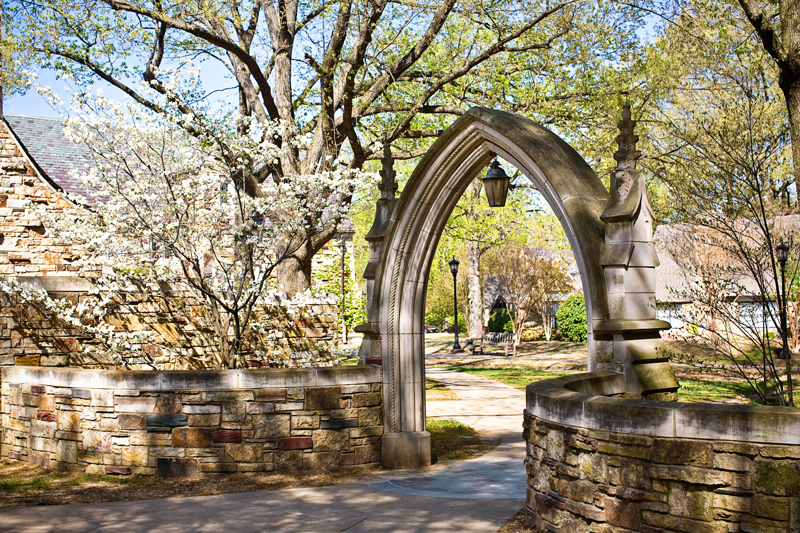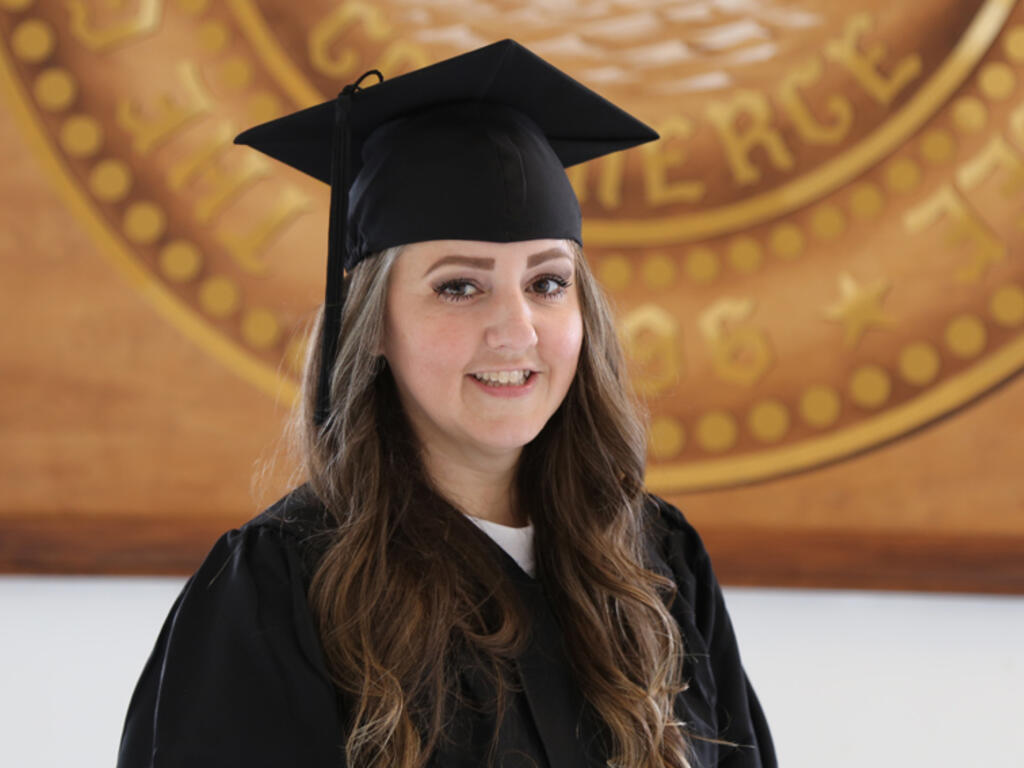By Troy Wiggins
On Monday and Thursday afternoons each semester, Stephen Haynes and three to five student volunteers meet outside of Burrow Hall. The contingent loads up in a small caravan and drives one hour and 13 minutes northeast across the rolling green hills and unincorporated townships of Shelby, Tipton, and Lauderdale counties. Their destination is the Women’s Therapeutic Residential Center (WTRC), a medium-security prison facility located inside the West Tennessee State Penitentiary in Henning, TN. WTRC provides skills-based programming, reentry services, and career development opportunities to the women residing there.
Upon arrival, the visitors remove their belts and shoes for a 20-minute trip through the prison’s main “checkpoint,” then navigate several more security checks as they make their way through the facility. When they reach the educational wing, with its vibrant door decorations and bulletin boards full of photos and student artwork, Rhodes faculty members and students are greeted by the smiling faces of up to 22 eager women, each of them here to attend the evening’s class.
These women—all Rhodes students—are laden with school supplies: textbooks open, notepads ready. During the day this classroom is used by the prison’s culinary education program: “Describe the four ‘mother’ sauces” is written in pink on the chalkboard.
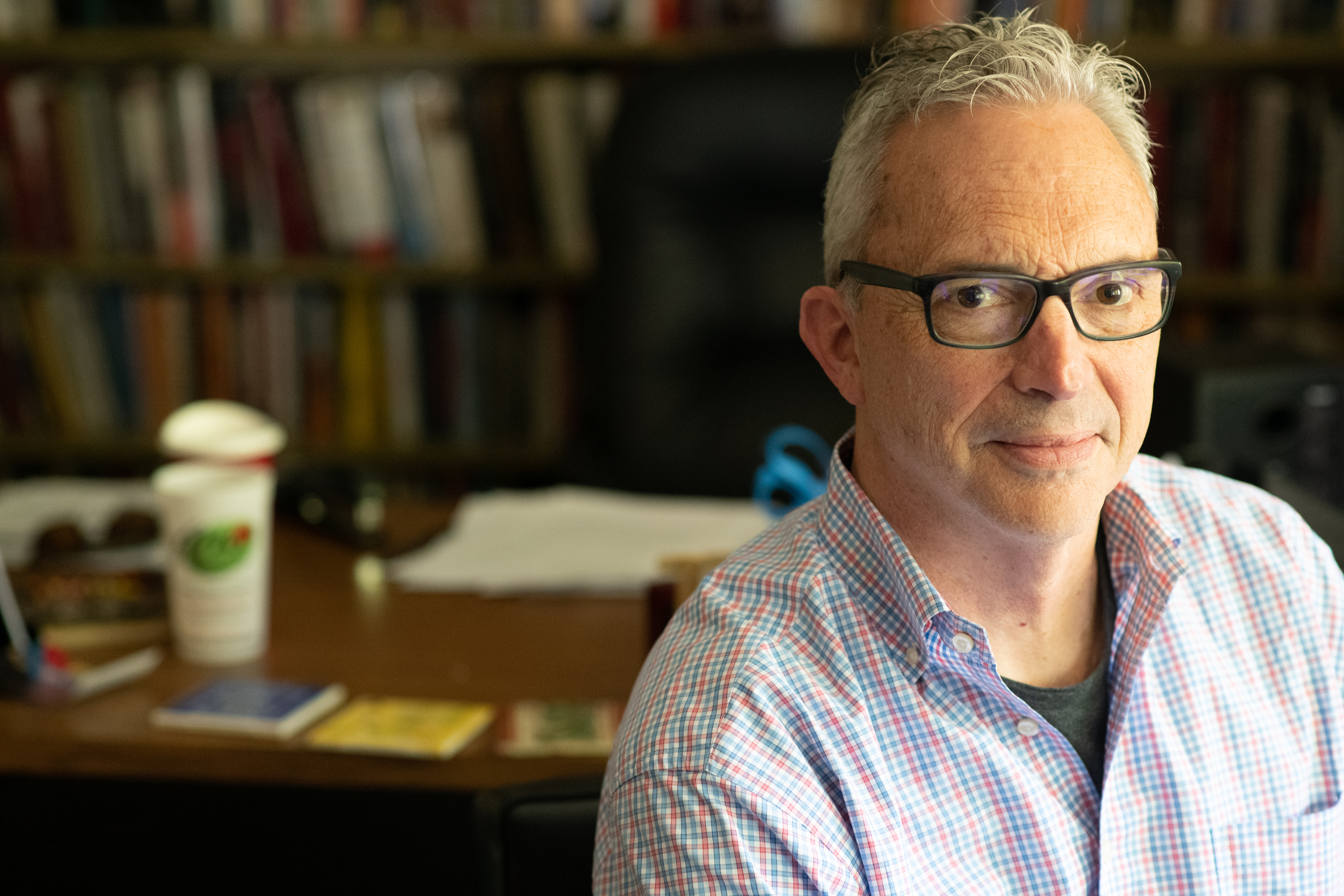
On these nights, the women, along with Haynes, guest faculty, and Rhodes student volunteers, fill this space with the sounds of college learning. Some nights there’s a lecture. Other nights, the entire class performs as the cast of Julius Caesar. Together, they discuss texts like The Epic of Gilgamesh; Paradise Lost; Narrative of the Life of Frederick Douglass, A Slave; and Elie Wiesel’s Night. Student volunteers facilitate multiple rounds of peer-review of the women’s papers.
This is Rhodes College’s Liberal Arts in Prison Program, a credit-bearing educational opportunity aimed at introducing these nontraditional students to the liberal arts experience and helping them imagine and achieve high educational goals.
And, by all accounts, it’s working.
Rhodes is one of a select few liberal arts colleges that provides in-person, credit-bearing courses designed to help incarcerated students obtain their bachelor’s degree. The program is the brainchild of Haynes, a veteran religious studies professor who found himself at a crossroads in the late 2010s. While he was considering an attractive job offer away from Rhodes, a colleague at Lipscomb University in Nashville inquired about the availability of college programs in West Tennessee correctional facilities. At the time of their conversation, incarceration rates for women in Tennessee had increased more than 15 percent since 2012.
The idea sparked something in Haynes, an ordained Presbyterian minister and advocate for social change. After some research, he discussed with other Rhodes faculty the possibility of developing a prison education program. Following a momentous meeting with the director of women’s programs for the Tennessee Department of Correction (TDOC), the Great Books Reading Group, a program designed to introduce students to the “Great Books” of the Western canon, was born in Fall 2016. It would be housed inside the WTRC, which had recently opened to ease the swelling population of women in county jails and to introduce rehabilitative measures designed to decrease rates of both incarceration and recidivism among Tennessee women.
“At the beginning, our mission was more exploratory, to try to figure out If what we offered at Rhodes in terms of a liberal arts experience was transferrable,” Haynes says. “We found that it was, and that we could create a prison learning environment that really serves students.”
Built on Rhodes’ The Search for Values in the Light of Western History and Religion, a program begun at the college in 1946 and now called SEARCH, the Great Books Reading Group met weekly from 2017 to 2019. Faculty across several academic disciplines—biology, English, chemistry, modern languages and literatures, political science, and more—were among the initial volunteer instructors.
The stars, it seemed, aligned again when in 2019 Rhodes instituted a certificate program in engineering, opening the door to more credentialing opportunities. Haynes expanded the Great Books Reading Group to a four-course program of study called Culture and Values. WTRC students who completed the sequence would receive a Certificate in Liberal Arts, a credential that would ease their entry into college programs inside the prison and beyond.
During more than 26 years of incarceration, Laura Jones participated in every skill-building program available to her. Early on, she completed the requirements for her GED, but sought out other opportunities to gain essential experience during the remaining years of her sentence.
“I did everything I could possibly think of,” says Jones, a 2021 program graduate who now works in logistics for a construction supply company. She spent eight years working in a dog obedience program, served as an inmate observer where she monitored residents on suicide watch, and restocked shelves in the prison library. While there, Jones took note of the authors, but it was rare that she gave them or their work more than a passing thought until WTRC education clerk Shonda James told her about a new program hosted by Rhodes College.
As James described it, women interested in the program had to undergo a rigorous application process, complete with an admission essay and panel interview, and there was a limited sign-up period. Jones had missed the deadline, but still dreamed of taking part. She persisted and eventually was able to enroll in the Liberal Arts in Prison program.
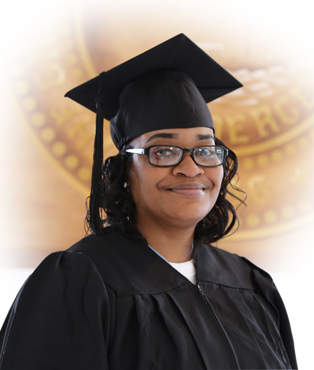
“I just wanted to learn,” Jones says. “You have to fight for your education when you're incarcerated.”
Brooke Whitaker possesses a similar drive. After 16 and one-half years incarcerated, Whitaker is slated for release in November.
“I'm hungry for education,” Whitaker says. “Rhodes gave me a community where I wasn't in prison anymore. I was able to have intellectual conversations with people that were meaningful, and that inspired growth and change. I've always been recognized for the negative things that I've done and being recognized for something positive is a high better than any drug or any feeling that I've ever had.”
Octavia Cartwright, a poet who enjoys the work of Toni Morrison and Maya Angelou, is another 2022 graduate of the Liberal Arts in Prison Program. She echoes the positive outcomes described by students in the program.
“We’ve all made mistakes,” says Cartwright, “but we deserve to be invested in. I got a sentence of 91 years, but I told myself I would take advantage of every opportunity. Here, I think I found my voice. I appreciate how humble the students and faculty are. They come in and treat us like humans, like we’re family.”
Students like Jones, Whitaker, and Cartwright spend class time learning the same skills as traditional Rhodes students, poring over the same texts, examining the same big questions, and writing the same essays. Over the course of the 14-week program, they are challenged intellectually to perform on par with their on-campus counterparts. Meanwhile, they help Rhodes fulfill its mission to instill a passion for lifelong learning, while creating effective leaders who translate compassion into action in their communities. The mission applies to students at WTRC as well, who not only help change the culture of the prison, but are able to imagine different futures for themselves and their families.
--
Transformation is a theme that pervades the Liberal Arts in Prison Program. But it is not limited to the incarcerated students. It occurs at every level, with every group involved in the program.
Madison Zickgraf Burke, a 2021 Rhodes graduate, began as the Great Books program’s very first student volunteer in 2019.
“I came to Rhodes as a transfer student my sophomore year. I was trying to find ways to get involved, and I knew I wanted to be a part of changing the criminal justice system,” Zickgraf Burke says. “I tried mock trial and I thought, ‘the legal path isn't really for me.’”
After a lunch meeting, Haynes invited Zickgraf Burke to join him as a student volunteer at the WTRC. She was instrumental in the program’s growth and success, eventually becoming its first student director. Zickgraf Burke organized volunteers, coordinated with faculty members and facility representatives, and even spoke before the faculty in support of launching a for-credit program.
“It was a really scary thing to do, to speak to all my past and future and current professors and say, ‘I think if you don't approve this program, you don't really get what Rhodes is doing, what our education is supposed to be,’” says Zickgraf Burke. “There were professors crying, and it is just a testament to the program. It passed pretty overwhelmingly.”
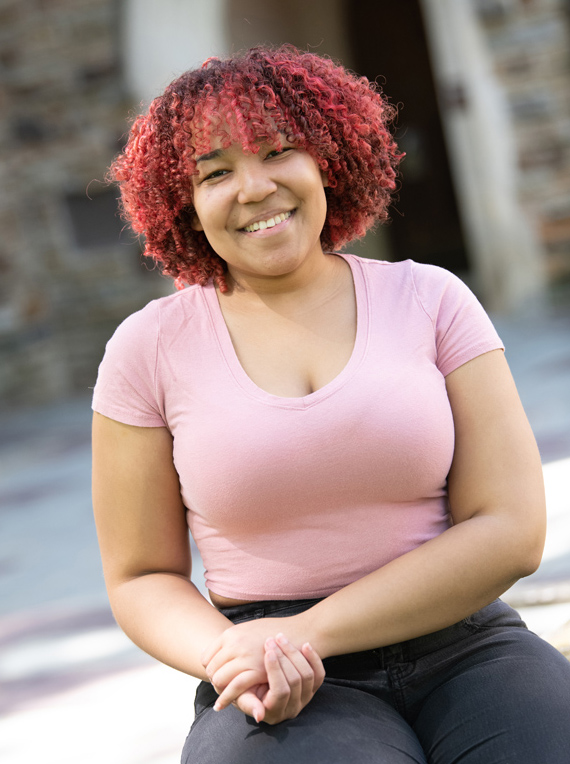
Zickgraf Burke left the program in 2021 to work as an editor at Oxford University Press, but volunteers like Katie Miller ’23 and Ashleigh Edwards ’25 are among the newest group of students who continue the program’s mission.
Miller, who signed up to volunteer her first year at Rhodes, is the program’s current student co-director, along with Izabella Arsenault ’25. Miller was looking for deeper community involvement during her time at Rhodes as she prepared for a career in law. She has found genuine connection with the women at the WTRC.
“The students bring in very different perspectives because they connect so well to all the material they read in class. We work on writing skills or analytical skills, but we also have real conversations,” Miller says. “It really does hurt when they share certain stories with you, but being with them, learning from their experiences, having them learn mine and still take me seriously, is valuable, and I appreciate having that relationship with them.”
Edwards also points to the power of connection as integral to what the student volunteers receive from the program. She relates her experience with Liberal Arts in Prison to her participation in Rhodes’ Mock Trial Program, where she sometimes acts as a prosecutor on trial cases.
“These are real people you're working with,” says Edwards. “Our criminal justice system, it's human, it has flaws. The Liberal Arts in Prison Program just really opens your mind to how we handle people that do what we call ‘bad things.’ It opens your mind to the flaws of the American system.”
Faculty are also deeply impacted by their teaching in the program. During a class visit in the Spring 2023 semester, Alexandra Kostina, associate professor of Russian Studies, led a discussion of Fyodor Dostoevsky’s Crime and Punishment, a novel whose thematic center is crime and its consequences. The class devoured the text, delving deep into the novel’s philosophical and spiritual lessons.
“I didn’t know what to expect,” says Kostina, “and I was pleasantly surprised by the level of students’ preparation, motivation, and engagement. Energy in the classroom was magic. Everyone was giver and receiver, learner and instructor. Some of the students lingered after the class was over and commented on how captivated they had been by the novel. I still feel the energy created by the impact that teaching in this course has had on me.”
But the program does more than introduce members of the Rhodes community to prison education and give them hands-on experience in the work. It inspires them to make change within the systems that affect these women and hamper their chances to maintain full, vibrant lives once released.
Zickgraf Burke, who was a finalist for the Rhodes Scholarship and will soon begin studying English in graduate school, plans to explore ways of impacting the systems that contribute to mass incarceration.
“I can't really go back to a world doing something that doesn't relate to helping people that are incarcerated, with the ultimate goal that we don't incarcerate people anymore,” Zickgraf Burke says.
Both Edwards and Miller are bound for law school. Miller, who recently went to the Tennessee Capitol as a prison abolition activist with the Memphis Interfaith Coalition for Action and Hope (MICAH), hopes to celebrate her recent Commencement in coordination with one of the 2023 graduates of the Liberal Arts in Prison Program. Edwards, a computer science major, hopes to become a patent lawyer—but her time in the program has her considering an alternative professional pathway.
“Meeting people that are directly affected by the criminal justice system kind of lit that fire under me. Now I'm like, do I want to go into criminal defense?” says Edwards. “This is the most real experience you can have at Rhodes.”

--
The program’s ultimate goal, according to Haynes, is true transformation--introducing these incarcerated students to the joy of engaging their natural intellectual curiosity, expanding their perspective on the world, and living “the life of the mind.”
Despite the program’s success, including receiving a $33,000 grant that helped the program secure invaluable technological resources, there are still challenges to negotiate. The COVID-19 pandemic required the Rhodes team to make logistical and academic adjustments, and although federal funding for prison education is about to become available again for the first time since 1994, most of the institutions utilizing this funding will use it to support on-line programs, with classes that are taught asynchronously. As the only in-person, credit-bearing postsecondary education program in West Tennessee, Rhodes is committed to maintaining the personal interactions that make for mutual transformation.
Haynes understands the challenges of serving this unique population. “I’m asking the college to do something revolutionary: to take a financial loss every time they invest in one of these students.”
Despite these looming obstacles, Haynes has plans for expanding the program to include students on the men’s side of West Tennessee State Penitentiary, as well as in facilities like the Northwest Correctional Complex in Tiptonville, TN. Student participants, like Zickgraf Burke, believe that the Liberal Arts in Prison Program is foundational work for the college.
“The way that higher education really provides meaning is if it's actually changing people's lives,” says Zickgraf Burke. “If we think about liberal arts as liberating, then we need to think about that in really tangible, material ways. The same way that a college education benefits us as free people ‘on the outside,’ as the students incarcerated would say, it is liberating for those people who are incarcerated. A Rhodes College credit can really change lives for those people. They deserve that.”
Students like Whitaker and Cartwright, once they receive their certificate from Rhodes, can continue their education at partner institutions like Dyersburg State College and Lane College, which apply Rhodes credits earned at WTRC to their degree programs. But this is only the start.
“By the time I retire I would like to establish a well-identified path between our program and graduation at Rhodes,” Haynes says. “I think that’s doable, given where we are right now.”
Cartwright, thanks in part to her hard work in the program, is being considered for executive clemency from the state of Tennessee.
Whitaker, who will graduate from the program and be released from the facility in 2023, is slated to be the first program graduate to attend Rhodes full-time as a transfer student, tentatively beginning classes in January 2024.
“I'm so excited,” Whitaker says. “I look at photos of campus on the computer sometimes. There’s this one picture on campus and it has this arch. It's fall and I'm seeing a student walk there. I sit in my room and I just envision myself there already. I cannot wait to stand in that exact place.”
